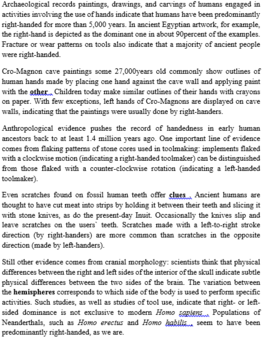Read the following passage and mark the letter A, B, C or D on your answer sheet to indicate the correct answer to each of the questions from 20 to 27.
It is commonly believed that school is where people go to get an education. Nevertheless, it has been said that today children interrupt their education to go to school. The difference between schooling and education implied by this remark is important.
Education is much more open-ended and all-inclusive than schooling. Education knows no limits. It can take place anywhere, whether in the shower or on the job, whether in the kitchen or on a tractor. It includes both the formal learning that takes place in school and the whole universe of informal learning. The agent (doer) of education can vary from respected grandparents to the people arguing about politics on the radio, from a child to a famous scientist. Whereas schooling has a certain predictability, education quite often produces surprises. A chance conversation with a stranger may lead a person to discover how little is known of other religions. People receive education from infancy on. Education, then, is a very broad, inclusive term; it is a lifelong process, a process that starts long before the start of school, and one that should be a necessary part of one’s entire life.
Schooling, on the other hand, is a specific, formalized process, whose general pattern varies little from one setting to the next. Throughout a country, children arrive at school at about the same time, take the assigned seats, are taught by an adult, use similar textbooks, do homework, take exams, and so on. The pieces of reality that are to be learned, whether they are the alphabet or an understanding of the workings of governments, have been limited by the subjects being taught. For example, high school students know that they are not likely to find out in their classes the truth about political problems in their society or what the newest filmmakers are experimenting with. There are clear and undoubted conditions surrounding the formalized process of schooling.
What does the writer mean by saying ''education quite often produces surprises"?
A. Educators often produce surprises
B. Informal learning often brings about unexpected results
C. Success of informal learning is predictable
D. It's surprising that we know little about other religions




Đáp án B
Hàm ý của tác giả là gì khi nói rang "education quite often produces surprises"?
A. Các nhà giáo dục học thường tạo ra những bất ngờ.
B. Việc học không chính quy thường mang đến những kết quả ngoài dự đoán.
C. Thành công của việc học không chính quy là có thể dự đoán.
D. Điều bất ngờ là chúng ta biết khá ít về tôn giáo khác.
Dẫn chứng: Whereas schooling has a certain predictability, education quite often produces surprises. Trái với việc học ở trường có sự dự đoán chắc chắn, giáo dục thường tạo ra nhiều điều bất ngờ.